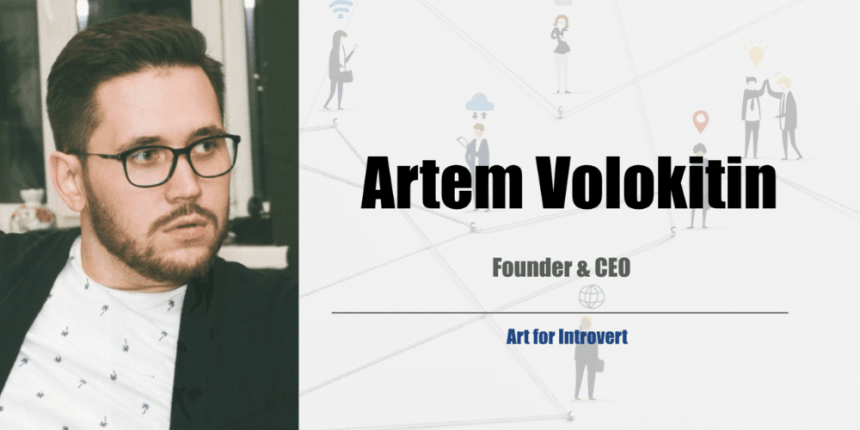Artem Volokitin is the founder and CEO of an EdTech project, “Art for Introvert”. Despite what the name might suggest, the project isn’t aimed just at introverts. The platform offers a wide range of courses – from philosophy to psychology – which its customers can explore from anywhere they like and at their own pace. Instead of being tied to traditional classrooms, people can dive into new subjects on their own terms. The idea of the project is to make education accessible to everyone, whether they’re outgoing or enjoy being on their own.
Artem, the topic of our conversation is the difference between extraverted and introverted people in professional communication. Does our success in our work really depend on how extraverted we are?
The pros and cons of extra- and introversion have been known, studied, and disputed for over a century – since Carl Jung first introduced these terms into psychology. And – however non-obvious, perhaps even far-fetched it may sound – the impact of our personality traits on the possibility of professional success is really deep. With the pace of changes in the professional realm, we have to be increasingly more adaptable and able to build good relationships; and that is where the issue of personality types – extroversion versus introversion – becomes even more acute.
In one of her articles published in the Harvard Business Review, Francesca Gino introduces a conversation using an intriguing approach: she shares a short personality test to measure how extroverted or introverted people are. Such methodology enables us to better understand how these personality traits might be reflected through workplace dynamics, so I would also recommend your readers take the test before proceeding to read this interview – it shall take no more than 2 minutes.
As per Gino’s evaluation, our society usually caters towards extroverts, and workspaces even inadvertently overlook a large proportion of the population who identify closely with introversion. This oversight reveals a pivotal discussion among professional circles about how the professional environment is challenging the stereotypical belief that extroversion can be equal to effectiveness at work. Moreover, Andy Lopata in Psychology Today addresses this notion from a more elaborate perspective. She suggests that sociability and assertiveness, which are extroverted traits, may generally seem like an aid to networking, but in practice, introverts can be equally or even more successful when it comes to networking, taking into consideration the professional context of such interactions. This vantage point adds the essential concept of how personality influences work relationships and networking strategies, stepping away from simple dichotomies toward understanding the intricate relationship between personal traits and situational demands.
A fundamental assumption that the workplace usually values extrovert characteristics prompts a broad professional discussion on how personality types could capitalise on their strengths to create successful professional bonds. The discussion isn’t merely theoretical; in essence, it questions if traditional ideas about success and suitability are valid within the business environment.
Do introverts and extroverts present different approaches to communication? And how does this work out in their professional relations?
Indeed, extroverts and introverts communicate differently in professional environments. Extroverts, being naturally socially inclined and skilled in networking, find it to be an easy second nature. Their sociable and gregarious demeanour helps them quickly form a broad web of acquaintances. Among those people who are likely to benefit most from personal contact (industry conferences, networking events, and social get-togethers), extroverts shine. They usually can make lasting impressions and start conversations that result in them forming strong professional networks and having a variety of options and links at their disposal.
Introverts, on the other hand, are known not to enjoy meeting new people as much as extroverts do; however, they certainly have something valuable to contribute to the networking process. Having great listening skills and profound analytical abilities, introverts possess the potential to create relationships that are real and well-structured. Although their network may develop at a slower pace than that of the extrovert, introverts flourish in producing genuine and steady relationships. They prefer individual communication since in this case, their power to exchange useful discourse can be complete and lasting. This tight bond often leads to professional relationships that are trustworthy and reliable, which can significantly boost one’s career trajectory.
So, which approach do you believe produces better results? Do extraverts have the edge here after all?
When it comes to building professional networks, the main advantage of extroverts is usually their ability to attract a large number of people with their inclination towards large-scale interactions. However, when one carefully analyzes how networking efforts lead to a return on investment, connection quality often overtakes quantity. Furthermore, introverts typically look for personal relationships with those who share their values; thus, it facilitates more efficient collaborations and partnerships.
This means that introverts may be more successful in building professional relationships in the long run? They build better lasting networks?
In certain aspects, yes. For instance, what distinguishes network efficiency for introverts versus extroverts is the use of follow-up. While extroverts can shine through their initial contact, introverts are masters of closing deals. Even though extroverts might be capable of creating a lasting first impression, it is introverts who frequently leave a strong and enduring mark with their continuous and considerate engagement that accrues over time. This continuing interest builds stronger networks in terms of depth and quality, leading to higher ROI on networking efforts in the end.
The element of networking that I want to highlight here is one of balance that should exist between widening the network and strengthening connections. Both strategies have their strengths, but the key is not to follow either mindlessly; instead, what matters is being aware and making use of the inherent strength you possess based on personality type, extroversion, or introversion, which has the potential to maximize your ROI on networking. I believe that the most successful individuals possess this ability and actively turn the strengths of their personalities into successful professional strategies.
Could you share examples of well-known professionals who represent both extroverted and introverted approaches to networking?
A bona fide example of the network approach from the extroverted side is Richard Branson, a famous entrepreneur in the Virgin Group of Companies. Having achieved fame thanks to his captivating charisma and ease of communication with different personalities, Branson has used his social dexterity to establish an immense networking base comprising influential people from all walks of life. This network has played a key role in the development and prosperity of his numerous projects. The capacity that Branson exhibits for engaging, motivating, and establishing significant relationships with broad audiences shows the significance of being extroverted when it comes to unleashing opportunities and nurturing business relations that can have an impact on a large scale level.
On the other side is Warren Buffett, known as the Oracle of Omaha, who is an example of how a social butterfly attitude may not be for everyone. Whereas Branson has famously thrown himself into all manner of social occasions, Buffett’s method is thoughtful and considered. The outcome of these efforts is a small number of deep relationships which stand the test of time and result in long-term partnerships and collaborations. This approach and strategy play a pivotal role in achieving the longevity and success experienced by Berkshire Hathaway, an American multinational conglomerate holding company, under Buffett’s guidance; hence demonstrating that introversion could be useful too in building networks with depth and loyalty.
What would you recommend our readers to consider to ensure they achieve the best results? How can they strike a balance between broadening their network and deepening existing connections?
When assessing the ROI of your networking efforts, which might appear to involve straightforward numerical calculations based on expert opinions, it’s crucial to factor in your own personal strengths and abilities. What I would like the reader to take away from this short excursion is that the ability to appreciate and benefit from networking peculiarities of both extroverts and introverts will enable one to create relationships with others that will make a sustainable contribution to achieving long-term success. No matter if it is a spontaneous discussion with numerous interlocutors during a crowded market gathering or a rather planned conversation alone, good networking should be seen as the use of individual potential to expand and diversify your professional sphere, while also increasing profit returns.








